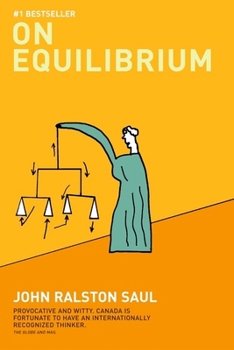On Equilibrium
Select Format
Select Condition 
Book Overview
Is it moral to sacrifice one's life for a higher goal? Why do many in the U.S. think it admirable to join the army but despicable for Palestinians to sign up with Hamas? How can we actually determine... This description may be from another edition of this product.
Format:Paperback
Language:English
ISBN:0140288031
ISBN13:9780140288032
Release Date:May 2005
Publisher:Penguin Canada
Length:384 Pages
Weight:0.85 lbs.
Dimensions:8.1" x 0.8" x 5.3"
Customer Reviews
5 ratings
Wonderful Book
Published by Thriftbooks.com User , 16 years ago
I'm dismayed by the low rating of this book. I enjoyed it immensely, particularly the part about Jean Moulin, the French Resistance leader who was an astonishing individual. I love Saul's books because he offers fascinating and little known examples from history while making angry but spot on points about the decline of our culture. I wish he wrote more.
Wonderful Book
Published by Thriftbooks.com User , 16 years ago
I'm dismayed by the low rating of this book. I enjoyed it immensely, particularly the part about Jean Moulin, the French Resistance leader who was an astonishing individual. I love Saul's books because he offers fascinating and little known examples from history while making angry but spot on points about the decline as a culture. I wish he wrote more.
Challenging and Mind-Expanding
Published by Thriftbooks.com User , 19 years ago
I really enjoyed this book. Saul's writing is somewhat challenging, but with effort it becomes rhythmic. I valued his perpectives on human orientations and how they balance each other. The notion of "equilibrium" in human activities is a sound one, especially in these times, in which we face so many imbalances in the environment, wealth, power, justice, and opportunity.
It's true; we need each other
Published by Thriftbooks.com User , 20 years ago
Saul's main idea is that there are six qualities - common sense, ethics, imagination, intuition, memory, reason - we need to keep in appropriate balance ("equilibrium") if we are to live in prosperity and peace. What this comes down to in overly simple terms is that we need to be aware that other people have points of view that are not identical to ours, but are not all that distant, either. In other words, we should pay attention to, and take seriously, what others have to say. Saul believes that when we make wealth our primary goal, we ignore the differences presented by others and force the world into our vision of it. This makes for dullness. He has a great point; we don't reach the good life by marching to our own beat. We get their by sharing shoes with others. The book can be frustrating at times, since he digresses every now and then. But there are many gems.
An insightful book; deeper than it looks
Published by Thriftbooks.com User , 22 years ago
John Ralston Saul's latest book carries on a theme that runs through Voltaire's Bastards and The Unconscious Civilisation: reason, deprived of memory, imagination, common sense and other human qualities, inevitably leads to disaster. Whereas Saul's previous books depicted the disaster (e.g. a chapter on the international arms trade, `The Flowering of Armaments' in Voltaire's Bastards) this book focuses on a remedy to unchecked reason- 6 human qualities, which balance one another. These are: Common Sense, Ethics, Intuition, Imagination, Memory & Reason. Initially I found this book fluffy reading; it lacks the detailed, fact-filled, and societally oriented argumentation that makes up Voltaire's Bastards. With time and reflection I have come to see wisdom in Saul's approach; the book is encourages us to rethink society through our own lives and with our own qualities. As Donald Rumsfeld lectures about invading Iraq, Reason listens to his arguments while Memory sees Rumsfeld shaking hands with Saddam Hussein in 1983. Witnessing the slow pace of the United Nations, Ethics worries that humanitarian aid is being delayed, but Common sense remains calm, knowing that compromise comes slowly or not at all.I highly recommend this book.






